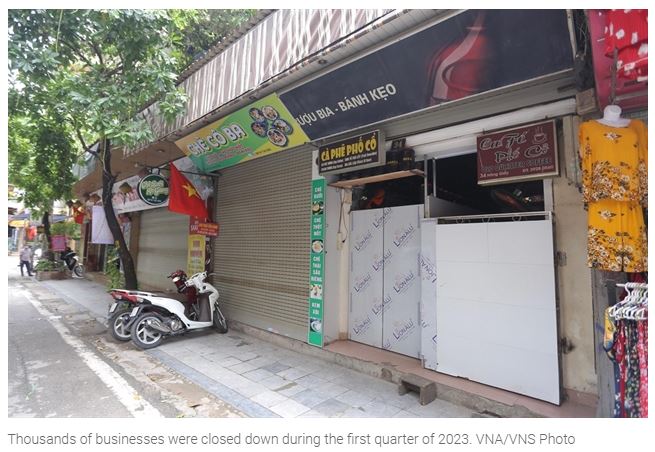Vietnam: Thousands of businesses close in Q1 as they struggle to access funds
A survey by the HCM City Business Association showed 83, out of 100 businesses, are currently struggling to stay afloat.
HÀ NỘI – Nearly 43,000 thousand businesses temporarily shut during the first quarter of 2023, an increase of 20.1 per cent compared to the same period last year, and 12,800 closed down permanently, according to a report by the General Statistics Office (GSO).
Phạm Đình Đoàn, Chairman of Phú Thái Group, said businesses would likely face greater challenges in the near future as the market had been experiencing lower demand for consumption on top of rising input costs and difficulty in securing capital.
A survey by the HCM City Business Association showed 83, out of 100 businesses, are currently struggling to stay afloat. Of these, 43 said they had problems with high-interest rates, 40 with difficulty in accessing capital sources, and 38 with the complexity of procedures to apply for loans.
The association urged the central bank to take measures to address these issues, namely lowering interest rates to around 8-8.5 per cent annually and streamlining loan procedures.
Another survey by the Việt Nam Chamber of Commerce and Industry (VCCI) indicated access to credit had become a major problem among the business community with 55.6 per cent, out of 12,000 businesses that participated saying credit was the biggest concern, steadily increasing from 34.8 per cent in 2019, 40.7 per cent in 2020 and 46.9 per cent in 2021.
Regarding the government’s 2 per cent interest support package, most businesses said it remained extremely difficult to meet the lending conditions set by banks, especially for small to medium-sized businesses.
Trần Thị Hồng Minh, head of the Institute of Central Economic Management Research under the Ministry of Planning and Investment (MPI), said while demand was great the number of businesses able to access the support package remained low, particularly among cooperatives and household businesses.
She said post-loan inspection was a major concern among businesses, as well as meeting the loan conditions, which had been said to be unclear by many.
Minh said the government must step up efforts in the implementation of support programmes as they are vital to the country’s ability to maintain and strengthen macroeconomic stability, keep inflation in check and stabilise the forex market.
Nguyễn Quốc Hiệp, chairman of the Việt Nam Construction Contractors Association, said liquidity had been a problem in his industry as developers found themselves unable to make sales, putting them at risk of mounting debt and bankruptcy.
In addition, contractors would likely get hit the hardest.
“Vietnamese contractors are small in size. In the construction industry, they must spend money first and get paid later,” he said.
“As developers are unable to pay, the contractor is in financial woe (having no money to pay for materials and labour while having to pay back bank loans). Contractors have to try to bid at all costs to save their businesses in the short term, but the more they do, the more they lose, and the closer they are to bankruptcy.”
Mạc Quốc Anh, secretary-general of the Hà Nội Small and Medium Enterprises Association, said borrowing from credit institutions remained an important channel for SMEs and urged the government to soon put out a guideline for the institutions in credit evaluation for SMEs.
In a recent interview with the press, Minister of Planning and Investment Nguyễn Chí Dũng said there was an urgent need to speed up the government’s plans for exempting, reducing, extending, postponing, and deferring taxes, fees, charges, and land use fees applied to 2023.
He also called for the Ministry of Finance to expedite the value-added tax refund process, maximising convenience for businesses in import-export and construction procedures. VNS


 English
English




